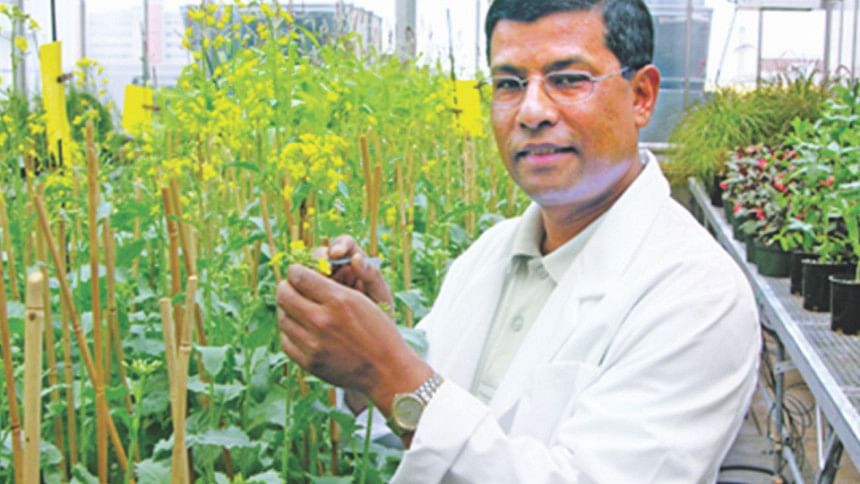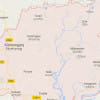Rahman saved canola farmers in Canada

Bangladeshi scientist Prof Habibur Rahman is now the most revered man within the scientific and the farming fraternities of Canada.
He has been working on oilseeds for a long time, and this year, his perseverance gifted the North American country its long-awaited answer to clubroot, the most significant disease threat to canola.
Canola -- one of world's top traded edible oil -- is Canada's number one cash crop, fetching the country an annual business of $20 billion. Over a fifth of global canola export volume comes from Canada.
However, in recent years, Canadian canola farmers lost up to one fifth of their potential yields to the disease.
Prof Rahman, born in Karimganj of Kishoreganj, has over the years developed dozens of canola cultivars, received a patent on his name and been engaged in cutting-edge research.
A professor at the University of Alberta, Rahman took up the challenge of fighting clubroot in 2004, a year after the Canadian canola growers started complaining about the emergence of the disease.
Twelve years down the line, his mission is now accomplished. He has finally succeeded in developing the first hybrid canola cultivar, which is twice more resistant to clubroot.
The new hybrid cultivar has been approved and registered by Crop Production Services (CPS), a unit of global agricultural products, services, and solution company Agrium Inc, with the Canadian Food Inspection Agency and is now available to the growers this season (May-July).
The cultivar is developed in partnership with CPS and the Natural Sciences and Engineering Research Council of Canada (NSERC).
In an exclusive interview through email, Prof Rahman told The Daily Star,” This specific cultivar carries two resistance genes; the main objective is to increase the durability of resistance against this disease."
It carries a resistance gene from Mendel, a European winter canola cultivar, and a second gene from an exotic germplasm. More than 250 sources of resistance were studied before the best two were picked, he pointed out.
The new canola hybrid cultivar offers double resistance, as opposed to all previous clubroot-resistant cultivars which only offer single resistance.
“It's common for single gene resistance to break down in time and to become susceptible,” explained Rahman. “But here, with this new cultivar, if one gene breaks down, the other one still remains there.”
Asked whether his invention would have any impact on Bangladesh's edible oil market, Prof Rahman said, "The knowledge I have in the fields other than of clubroot disease resistance, such as genetic diversity and high seed yield in hybrid cultivars, earliness of flowering and maturity, can also be applied by Bangladeshi researchers for the development of improved canola cultivars."
A few months back, a researcher from Bangladesh Agricultural Research Institute (Bari) informed him about the occurrence of clubroot in Bangladesh. "I provided him with some information from my research.”
Prof Rahman, who often travels to China (where canola is a big crop) to deliver lectures on canola genetics and molecular breeding and advise the Chinese canola researchers, said he was planning to visit Bangladesh in July.
During his visit, he is likely to deliver a similar talk at Dhaka University and at Bari in Joydebpur.
Talking to The Daily Star over phone, BARI Director General Rafiqul Islam Mondal lauded Prof Rahman's success in canola breeding. "Clubroot is not a significant disease threat in Bangladesh yet."
Currently, Bangladesh produces one fourth of the domestic requirements of mustard oil (derived from rapeseed) while depends on canola imports for the rest.
Canola is one of two cultivars of rapeseed and the word "canola" was derived from “Canadian oil, low acid”. While homegrown mustard oil is rich in erucic acid that causes the pungency, imported canola has a low amount of it.
Prof Rahman is now also in an advanced stage of developing early maturing variety of canola. It is aimed at harvesting canola before the July heat strikes and causes any damage.
"Recently, I have mapped a few genes [of chromosomes] involved in the control of earliness of flowering under long-day conditions [e.g. Canada],” he said.
“I also mapped a photosensitive gene; this knowledge can be applied by the Bangladeshi researchers for the development of early flowering/maturing canola cultivars.”
Prof Rahman has now two research associates (PhD), one postdoctoral fellow (PhD), four research assistants/technicians (BSc/MSc), seven graduate students (PhD or MSc level), and three casual workers under his tutelage. One of the PhD students is Bangladeshi.
Prof Rahman, who had his BSc Ag (Hons), and MSc Ag in Genetics and Plant Breeding from Bangladesh Agricultural University, Mymensingh, earned his PhD from Royal Veterinary and Agricultural University in Copenhagen, the capital of Denmark.
He worked at Danisco in Denmark for 14 years as a researcher/breeder in the discipline of canola genetics and breeding. Later, he led the company's European programme.
Danisco is a Danish company with activities in food production, enzymes and other bioproducts as well as a wide variety of pharmaceutical grade excipients.
"In Denmark, I developed over 40 canola cultivars, received a patent, and conducted cutting-edge research, and this moved me from Europe to Canada."
Prof Rahman joined the University of Alberta in 2003 and since then, he has been leading the Canola Genetics and Molecular-breeding research programme at the university.
Speaking about his dream, he said he would like to establish an educational institute in Karimganj, his birthplace, after his parents' name to provide the locals with a high-standard of education. "I also like to teach short courses at the universities in Bangladesh, and provide advice to the Bangladeshi researchers working in the discipline of canola genetics and molecular breeding."

 For all latest news, follow The Daily Star's Google News channel.
For all latest news, follow The Daily Star's Google News channel. 








Comments